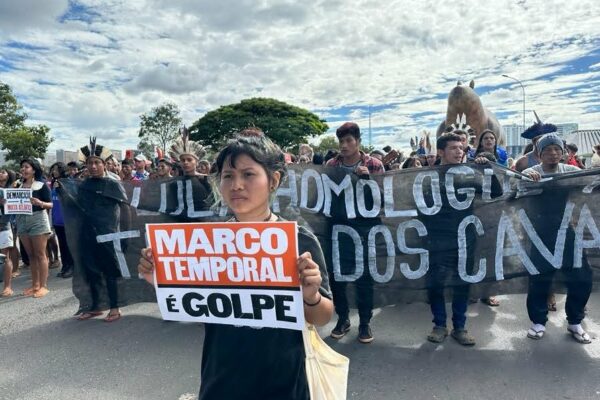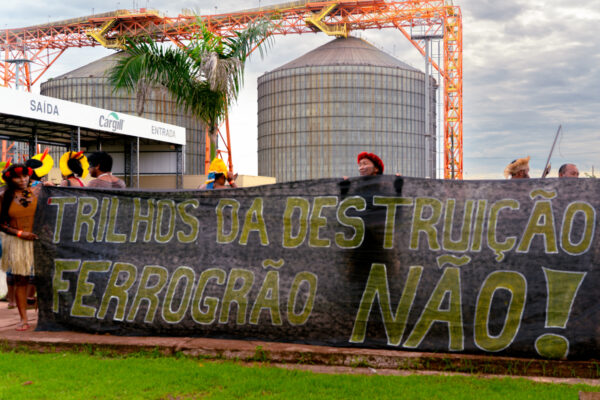Shivankoreni, Peru – Indigenous communities in the Peruvian Amazon recently shut down public hearings for the extension of the Camisea project in protest over failures by the government and companies – namely Pluspetrol and Hunt Oil – to address major impacts caused by the original project. Representatives of the Machiguenga people have made the trek to Lima to draw public attention to their concerns.
The Machigeunga are outraged by the lack of adequate time to analyze a 4,000 page Environmental Impact Assessment for Camisea 2, a 140,000-acre concession called Block 56 that is adjacent to the initial Camisea concession. Communities are also concerned about pipeline ruptures and spills like the one that fowled local rivers in December.
On January 20, scores of Machiguenga protested hearings in the Native community of Shivankoreni by banging rusty oil barrels left behind by Shell in the 1980s, drowning out the voice of government officials and forcing the government to suspend the event.
The Peruvian government had hoped to present the new Environmental Impact Assessment (EIA) for Block 56 at three public hearings in Shivankoreni, Quillabamba and Cusco as required by law in order to move ahead with approving the project’s environmental license. The government suspended all three hearings following the protest.
COMARU, a regional federation representing the Machiguenga communities, asserts that they have not been consulted prior to the creation and auctioning of the new lot and that the project, like the original Camisea project, has advanced at the cost of the Machiguengas’ rights to consultation, dignity, health and a clean environment, as is required by the Constitution of Peru and International Law. The government has so far rejected a number of formal requests by regional indigenous organizations for more time to analyze the project and come to collective decisions about their demands. The densely technical EIA was only released on November 10.
Less than five months after the inauguration of the Camisea pipeline serving the original concession, on December 22, the pipeline ruptured spilling liquid petroleum gas for four hours into the Kemariato stream, a tributary of the Urubamba. The Machiguenga communities report that the smell and effects of the spill reached more than 75 kilometers down river, causing contamination of local drinking water and harming aquatic life. The communities assert that both the government and the project consortia have yet to give an adequate explanation for the incident, over one month after the spill.
Outraged about contaminated waters and fish, the Machiguengas broke with cultural norms of quiet restraint and organized a protest at the door of the public hearing with signs reading “Pagoreni is not for sale, Machiguengas will defend it.” The protest outside the meeting included leaders of three communities who wanted to highlight the non-participation of all seven of the Machiguenga communities in the region, representing over 2,500 indigenous inhabitants living in the area called Block 56.
The declaration released by the Machiguenga Council known as COMARU states: “From the beginning the companies of the Camisea consortia have trampled the rights of our people and in the last few months our communities have reported landslides along the pipeline, but the companies deny these facts and affirm that there are no problems.”
An investigation of the spill by the Peruvian Energy Investment Agency, OSINERG, is currently pending. The pipeline has approval to receive $130 million in public financing from the Inter-American Development Bank (IDB). So far, the loan has not been disbursed.
“The recent gas spill in Camisea should be a red flag for the IDB. The IDB should withhold loan disbursement given its loan conditions are proving ineffective in safeguarding this fragile rainforest environment,” said Maria Ramos, Peru Coordinator for Amazon Watch.
Community leaders arrived in Lima yesterday to present their concerns to the press and public.
BACKGROUND:
Block 56 is a 140,000 acre (58,000 hectare) area in the Lower Urubamba region containing the Pagoreni and Mipaya fields. More than 90 percent of the area is classified as primary rainforest. Over 82 percent of the area encompasses the legal territories of the Machiguenga communities as well as areas occupied by Kirineri indigenous people. The Kirineri are a highly vulnerable indigenous group with little or no contact with the outside world.
On September 7, 2004, Perupetro signed a contract for Block 56 with the same major companies involved in the initial Camisea project. Sponsors expect to invest $500 million in Camisea 2 to tap natural gas and petroleum liquids from the Pagoreni field. An additional $1.1 billion is planned to increase the capacity of the Camisea pipelines to carry natural gas and the natural gas liquids to the coast. The ultimate goal is to construct a new facility for gas liquefaction to deliver liquefied natural gas (LNG) to markets in Mexico and the West Coast of the United States.
For additional background information and COMARU’s declaration, visit WWW.AMAZONWATCH.ORG. Photos of the Jan 20 protest are available by emailing maria@amazonwatch.org













